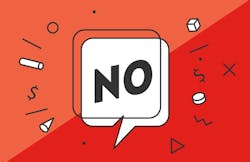Sure, when this customer called you, there were lots of reasons to say “no.” Your shop was all booked up for the week. You didn’t have enough technicians to handle the work. It was too late in the day. Seemingly, there was no way you could handle this one extra job.
Here’s the thing, though: saying no cost you money.
Lots of money.
To be exact, roughly $23,000 over the course of 12 months. Because you didn’t just say no to this one customer—this is likely a pattern of behavior, as it is with most shops, a recent study found. Marchex, a mobile analytics company, analyzed 1.8 million phone calls placed by consumers to nearly 5,000 auto repair providers and found that, overwhelmingly, choosing to use positive language over negative language makes a huge impact on the bottom line.
“Companies need to take a closer look at why they’re saying 'no' to their customers, consider the revenue loss that results from that and determine what steps they can take to say 'yes' more often,” Marchex senior vice president Matt Muilenburg says.
So, how do you identify negative language? What contributes to its presence? And how can your shop effectively utilize more positive language? Muilenburg discussed all this and more as he broke down Marchex’s study for Ratchet+Wrench.
What is the difference between using positive language versus negative language?
Economically, we think it transfers over between $25,000-$30,000 per month in incremental revenue for the store if they change talk tracks and drive appointments.
What we really learned from the study is that negative language flat out has an impact on your business. Shops that use all those variants of “no,” “can’t,” “won’t,” “don’t” and “shouldn’t” then drive customers away. This happens even if the shop’s message is positive and is trying to engage the customer.
So many shops rely on the service advisors to answer the phone but those advisors get pressed to answer and then have to get back to other duties and they start saying 'no.' If you change the language to, “We’d be delighted to, can we do it tomorrow?” then the sales representatives end up booking more appointments and driving sales.
What are some other factors playing into that? In the survey, it mentioned that being short staffed is a factor.
Yes, absolutely it can be. When a shop is down on staff, then the employees will let the calls ring longer and say no more frequently. For those in the shop, the real-time impression probably feels like the right answer to give, but, from a customer perspective, it might be thought of differently.
The time of day also plays a role. As the day gets longer or it gets later in the week, then shops tend to say "no" more frequently. At this time, the shop’s schedule is already filling up but what they are missing are opportunities for the following week.
Does this merely apply to work you’ll accept, or are there other situations in which negative language is used, like in not coming down on a price?
You can often hear, “We cannot guarantee we’d work on it today,” which is a negative way of saying you can bring it in but we might not work on it until tomorrow. This phrase tells the customer that the shop does not have the capacity to service him or her.
We hear this type of “yes” mentality preached in the industry. And then others suggest to only bring in certain types of cars and customers. Should there be a balance there, or should a shop just take in everyone it can?
You see that in a franchise space. Most dealerships will not work on any brand you bring it but just the brands they specialize in.
In the aftermarket and service space, you hear that a service is not done in the shop. For example, a shop could be working on everything that rolls like wheels and alignment but would not touch the car’s muffler.
You cannot say yes all the time, but staff should be trained to offer an alternative. Instead say, “Sorry, we don’t work on mufflers but there is a shop down the street that might be of service.”
Our point of the study is that you can always, “Yes—but,” which is language that leads to better business results.
What should shop owners do if they realize their business has negative language? What does that say about the business and how can they fix the problem?
One of the things that would be interesting would be to go back to the data and compare franchise locations to independent locations. Mystery shopping is an old-school technology in the modern world. The business leader can score customer calls as they are happening and then turn that into training programs to see which locations are struggling because the staff is saying no too much.
A boss can help the store prioritize who is taking the phone call. If Matt is busy, then it rolls over to Travis and if Travis is busy then it rolls over to Jessie—those types of things.

